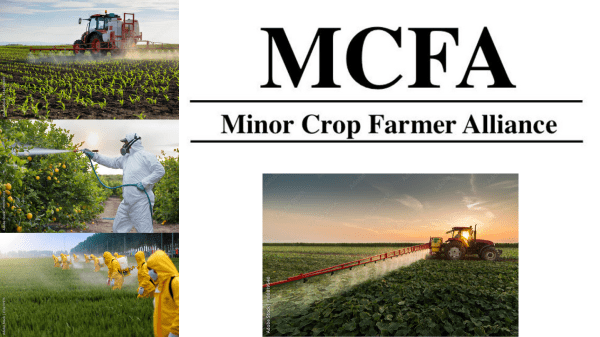Washington, D.C. – Concerned that specialty crop growers are at risk of needlessly losing access to key “minor use” crop protection tools, Minor Crop Farmer Alliance (MCFA) is calling on the Biden administration to use sound science to direct the federal government’s pesticide safety decision-making, and to promote sound science with the U.S.’s international trading partners.
 “Specialty crop growers want to do their part in protecting human health and the environment. So we want to be partners with the government agencies working in that arena. We feel that we can make a positive contribution to the process if we have a seat at the table,” said MCFA Chair Jim Cranney of California Citrus Quality Council. “And we feel strongly that decisions should be driven by actual usage data and realistic modeling scenarios. ”
“Specialty crop growers want to do their part in protecting human health and the environment. So we want to be partners with the government agencies working in that arena. We feel that we can make a positive contribution to the process if we have a seat at the table,” said MCFA Chair Jim Cranney of California Citrus Quality Council. “And we feel strongly that decisions should be driven by actual usage data and realistic modeling scenarios. ”
MCFA is working to ensure that U.S. pesticide and related trade policies are based on sound science, but that is an uphill battle full of challenges, reported Cranney and other MCFA volunteer leaders.
For example, the federal agency charged with periodically re-evaluating the safety of existing pesticides – the Environmental Protection Agency – is relying on highly-conservative computer models to assess the risk to human health from drinking water, rather than using readily available data from actual water monitoring programs. Meanwhile, the federal services tasked with protecting endangered species – including the Department of the Interior’s U.S. Fish and Wildlife Service and the National Oceanic and Atmospheric Administration’s National Marine Fisheries Service – are exaggerating the scale of habitats of threatened or endangered species.




“Our industries rely on exports, and our exporters shouldn’t have to continually battle political barriers to trade masquerading as science-based decisions,” said Epstein. “MCFA works in the international trade arena to encourage our trading partners to harmonize their Maximum Residue Limits (MRLs) to science standards similar to the United States.”
At their recent Annual Meeting, MCFA’s membership approved a 2021 work plan that identified eight priority areas to guide the alliance’s work with the Biden administration’s EPA, U.S. Department of Agriculture and the federal services, and in the U.S.’s international relationships.
Founded in 1991, Minor Crop Farmer Alliance is funded and led entirely by fruit, vegetable, nut, ornamental plant and other specialty crop producer organizations from across the United States. MCFA advocates for sound science in government minor-use pesticide policies, so that growers have access to safe, effective crop protection tools.
“For 40 years, we have worked in a small, technical space that has a big impact on the specialty crop industry, said Cranney. “The north star guiding MCFA’s work is to be led by and follow the science, advocating for policy that is informed by science, that is transparent and that includes the public – including specialty crop growers.”
About Minor Crop Farmer Alliance
Minor Crop Farmer Alliance advocates for use of sound science in government minor-use pesticide policies, so that growers have access to safe, effective and affordable crop protection tools. Founded in 1991, we are funded and led by fruit, vegetable, nut, ornamental plant and other specialty crop producer organizations from across the United States. To learn more, visit us online.



